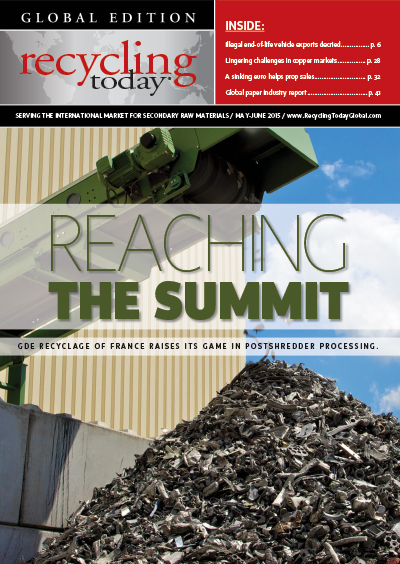|
|
Many of us, when growing up, were exposed to the notion that the human body has very intentionally been designed with two ears and one mouth. The implication of this design principle is that we should listen at least twice as much as we talk. Governance is not always practiced with this principle in place, though around the world both the wisdom and the compassion of those in charge often is judged by whether they stay in touch with constituents who are working hard and trying to live honestly. Those working in the recycling industry, unfortunately, frequently encounter governmental dictates they are certain have been formulated without a single ear having been directed toward their voices. On April 1, 2015, scrap buyers in India and sellers around the world woke up to find that one government agency had instantly reconfigured the way they go about their business. On that day, India’s Directorate General of Foreign Trade (DGFT) announced it would immediately require, in addition to in-person inspections, the video recording of the entire process when an overseas shipper of scrap loads a container to be sent to India. An edited version of this video is then required to be emailed to the DGFT showing the faces of key personnel in the loading, inspection and shipping process. In parts of the world where April 1 is celebrated as April Fools’ Day, traders may have hoped the proclamation was a prank. Unfortunately, subsequent efforts by the Metal Recycling Association of India (MRAI) and other organizations indicate the new edict is very real. Officers of the MRAI had spent several years informing India’s government that its duty on imported scrap was harming the Indian metals industry, and finally received some relief in February 2015. Less than two months later, however, the MRAI was faced with the DGFT inspection regimen, which seems clearly to have been enacted without any dialog between DGFT policymakers and the Indian metals industry. The conversation soon started. In an April 7, 2015, advisory to MRAI members, Secretary General Amar Singh said MRAI had already met once with DGFT and had a second meeting scheduled to “explain the difficulties faced by exporters, importers and PSICs (Pre-Shipment Inspection Certificate inspectors) of implementing the new procedures. MRAI conveyed it is not practical to submit video recordings, etc.,” Singh wrote to member companies. Several days later, the MRAI was able to announce a 30-day delay in the policy taking effect, and it has been abetted in the dialog with DGFT by recycling associations from around the world. Unfortunately, it is unlikely to be the last time a policymaker somewhere in the world issues a recycling-related proclamation without first listening to the comments of recyclers. |

Explore the May 2015 Issue
Check out more from this issue and find you next story to read.
Latest from Recycling Today
- Bridgestone introduces retreating plant virtual tour
- USTMA announces Tire Recycling Foundation
- Dow announces agreement with Freepoint and MOU for Asia Pacific market with SCGC
- Mixed signals chracterize ferrous market
- Researchers look into ironing out a secondary aluminum limitation
- Analysis: Chemical recycling’s ‘inflection point’ nearing
- Machinex system in Québec targets organics diversion
- Northern Shenandoah region awarded $3.9M for recycling infrastructure






